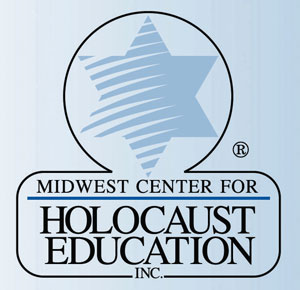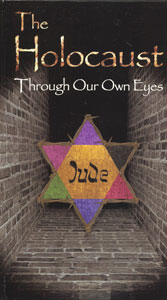 In celebration of 18 years of service to the community and in appreciation of the community’s strong and generous support, the Midwest Center for Holocaust Education will present a free public film series, to take place one Thursday evening each month from Jan. 20 through June 23. The six featured films are part of MCHE’s Witnesses to the Holocaust Archive project. (For complete schedule, see below.)
In celebration of 18 years of service to the community and in appreciation of the community’s strong and generous support, the Midwest Center for Holocaust Education will present a free public film series, to take place one Thursday evening each month from Jan. 20 through June 23. The six featured films are part of MCHE’s Witnesses to the Holocaust Archive project. (For complete schedule, see below.)
“The films in this series,” says Fran Sternberg, Ph.D., MCHE’s in-house historian and director of university programs and adult Education, “serve as a powerful reminder of the lessons and implications of the Holocaust and the significance of memory in the transmission of history as well as a fitting acknowledgment and validation of the individuals in our community whose lives were directly touched by the Holocaust.”
MCHE Executive Director Jean Zeldin, who served as coordinator of the original video project, said The Witnesses to the Holocaust Archive plays a critical role in preserving a precious historical resource.
“Our goal in presenting this film series is to highlight and share the treasure trove of memory that MCHE has collected and recorded over the past 18 years. We also hope it will encourage people to visit our Resource Center and avail themselves of the opportunity to view the individual testimonies, which are, after all, a community legacy,” Zeldin said.
Each film will be preceded by a topic-appropriate introduction and followed by a “question and answer” session, facilitated by Sternberg and members of the Holocaust Education Academic Roundtable (HEART), MCHE’s symposium for university educators. A light reception will follow each program and DVD copies of the evening’s featured film will be available for purchase after the each screening. There is no charge for admission; reservations are requested for planning purposes by calling (913) 327-8196 or e-mailing . The film series is partially funded by a grant from the White Theatre Grantor Fund of the Jewish Community Foundation of Greater Kansas City.
MCHE’s local history
Sternberg notes that since the 1930s, more than 200 Holocaust refugees and survivors have come to call the greater Kansas City area their home and “our community is the richer for it.”
Recognizing this, soon after its founding in 1993, MCHE undertook its first major project: the production of 48 videotaped interviews of local Holocaust survivors, refugees and witnesses. The project was conducted in cooperation with the Fortunoff Video Archive at Yale University, and supported by grants from the William T. Kemper Foundation, the David Woods Kemper Memorial Foundation, and the Oppenstein Brothers Foundation.
Since 2006, grants from the Jewish Heritage Foundation of Greater Kansas City, the Jewish Federation of Greater Kansas City, and the Conference on Jewish Material Claims against Germany have enabled MCHE to digitize the original full-length videotapes, to edit them into lengths suitable for classroom instruction, and to craft teaching tools to enhance their educational value. Outpost Worldwide provided technical and editorial expertise as well as special consideration to MCHE in the production of the videotapes and films.
The film project is supervised by Sternberg and Jessica Rockhold, MCHE director of school programs and teacher education, who also provided voice-over narration. Five of the films are organized around specific Holocaust-related themes: Kristallnacht, Ghettos, Auschwitz, In Hiding, and Liberation. The sixth film – The Holocaust: Through Our Own Eyes, which will be shown first — presents an overview of the Holocaust and the events leading up to it. All of the films make extensive use of excerpts from the 48 videotaped interviews.
While many Holocaust education centers in the United States have collected and recorded first-person testimonies, Sternberg said MCHE is one of very few centers to have combined those testimonies with maps and archival and personal photographs into films with significant educational and public appeal.
While the full-length interviews, the edited interviews and the topical films are the heart of the archive, they are supplemented by a variety of additional materials: 50 audio-taped interviews of local survivors and refugees conducted in 2000, as part of MCHE’s Portrait 2000 exhibit; 66 written and audio-taped reminiscences collected for the keepsake journal commemorating MCHE’s 10th anniversary; papers and memorabilia relating to the organization and activities of the New Americans Club, donated by the late Jack Igielnik, one of the club’s founders; and a 2006 survey of local survivors and refugees about their post-immigration experiences. Several interns from the University of Kansas, the University of Missouri-Kansas City and CAJE rendered invaluable assistance transcribing, indexing and cataloguing these materials. The archive is housed in a dedicated space in MCHE’s Resource Center. Edited interviews are available for free loan, and full-length testimonies may be viewed on site.
Film offers compelling overview of the Holocaust
 “The Holocaust: Through Our Own Eyes,” created and produced in 1994 by the Midwest Center for Holocaust Education, was the first MCHE project to use excerpts from the personal interviews with 48 Kansas City area eyewitnesses — refugees, camp survivors, individuals in hiding, non-Jewish citizens of German-occupied Europe, and liberators — that it videotaped over the course of 16 months in cooperation with the Fortunoff Video Archive at Yale University.
“The Holocaust: Through Our Own Eyes,” created and produced in 1994 by the Midwest Center for Holocaust Education, was the first MCHE project to use excerpts from the personal interviews with 48 Kansas City area eyewitnesses — refugees, camp survivors, individuals in hiding, non-Jewish citizens of German-occupied Europe, and liberators — that it videotaped over the course of 16 months in cooperation with the Fortunoff Video Archive at Yale University.
Beginning with the turmoil in Europe in the wake of World War I and ending with the survivors’ bittersweet arrivals in America, the film traces the origins, implementation and aftermath of the Holocaust, punctuating the larger historical narrative with revealing looks at the personal tolls the Holocaust exacted. Although the film uses archival film footage and photographs as well as voice-over narration to provide coherence and context, it is the witness testimony that gives the film its real power. One survivor remembers how the Germans forced her parents to give away her pet bird because Jews were forbidden to have pets. Another survivor relives the night the Germans shot her father as she and her family looked on helplessly. Yet another survivor describes how his non-Jewish neighbors were fighting over their possessions as he and his family were about to be forced into a ghetto. And a former U.S. Army officer who helped liberate Buchenwald remembers his shock at the sight of the camp’s Jewish inmates.
Fittingly, MCHE will be featuring “The Holocaust: Through Our Own Eyes” as the first film in its free public film series commemorating its 18th anniversary. The screening will take place at 7:30 p.m. Thursday, Jan. 20, in the Lewis and Shirley White Theatre at the Jewish Community Campus, with partial funding provided by a grant from the White Theatre Grantor Fund of the Jewish Community Foundation of Greater Kansas City. Like the original videotaping project, the film was made possible by grants from the William T. Kemper Foundation, the David Woods Kemper Memorial Foundation, and the Oppenstein Brothers Foundation, with special consideration from Outpost Worldwide. It was also the recipient of two awards presented by the Kansas City chapter of the International Television Association (ITVA) in November 1996.
The film will be introduced by Fran Sternberg, Ph.D., MCHE’s in-house historian and director of university programs and adult Education, who will also facilitate a question-and-answer session afterwards. A light reception will follow and DVD copies of the film will be available for purchase. There is no charge for admission; reservations are requested for planning purposes. Call (913) 327-8196 or e-mail .
Film series schedule
The films will be shown at 7:30 p.m. at the Jewish Community Campus on on the following Thursday evenings:
Jan. 20, Lewis and Shirley White Theatre: “The Holocaust: Through Our Own Eyes”
Feb. 17, Social Hall: “Witnesses to the Holocaust: Kristallnacht”
March 10, Lewis and Shirley White Theatre: “Witnesses to the Holocaust: Ghettos”
April 14, Lewis and Shirley White Theatre: “Witnesses to the Holocaust: Auschwitz”
May 19, Lewis and Shirley White Theatre: “Witnesses to the Holocaust: In Hiding”
June 23, Social Hall: “Witnesses to the Holocaust: Liberation and After”
There is no charge for admission; reservations are requested by calling (913) 327-8196 or e-mailing . A reception will follow each film. DVD copies of the evening’s featured film will be available for purchase.



